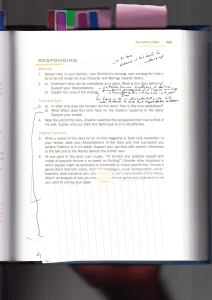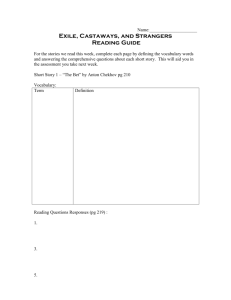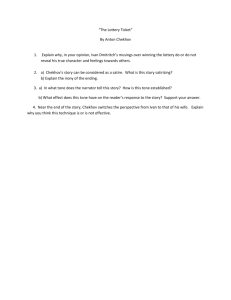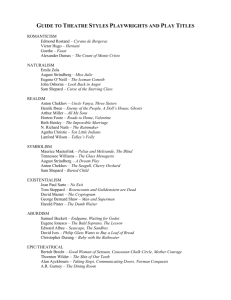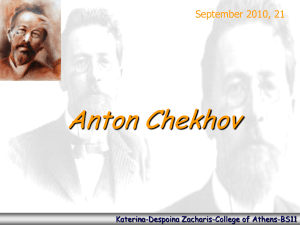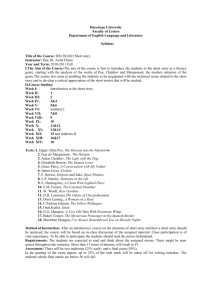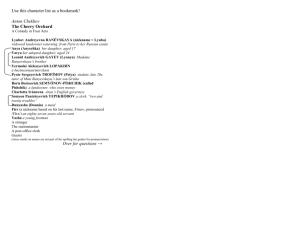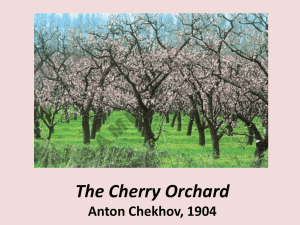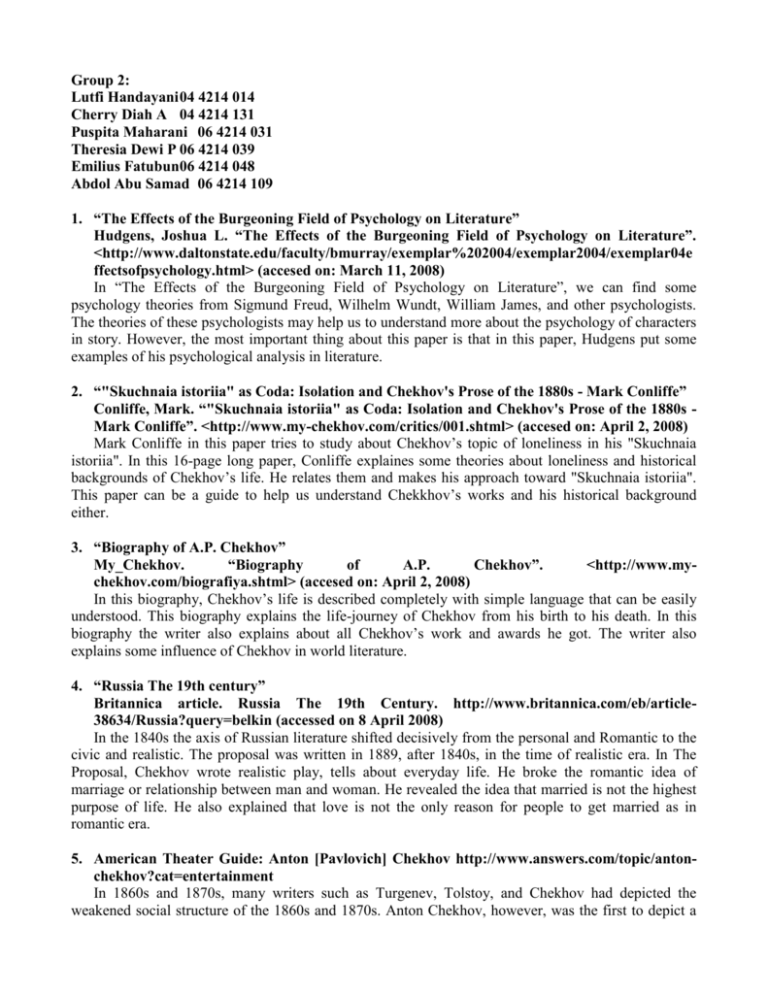
Group 2:
Lutfi Handayani 04 4214 014
Cherry Diah A 04 4214 131
Puspita Maharani 06 4214 031
Theresia Dewi P 06 4214 039
Emilius Fatubun06 4214 048
Abdol Abu Samad 06 4214 109
1. “The Effects of the Burgeoning Field of Psychology on Literature”
Hudgens, Joshua L. “The Effects of the Burgeoning Field of Psychology on Literature”.
<http://www.daltonstate.edu/faculty/bmurray/exemplar%202004/exemplar2004/exemplar04e
ffectsofpsychology.html> (accesed on: March 11, 2008)
In “The Effects of the Burgeoning Field of Psychology on Literature”, we can find some
psychology theories from Sigmund Freud, Wilhelm Wundt, William James, and other psychologists.
The theories of these psychologists may help us to understand more about the psychology of characters
in story. However, the most important thing about this paper is that in this paper, Hudgens put some
examples of his psychological analysis in literature.
2. “"Skuchnaia istoriia" as Coda: Isolation and Chekhov's Prose of the 1880s - Mark Conliffe”
Conliffe, Mark. “"Skuchnaia istoriia" as Coda: Isolation and Chekhov's Prose of the 1880s Mark Conliffe”. <http://www.my-chekhov.com/critics/001.shtml> (accesed on: April 2, 2008)
Mark Conliffe in this paper tries to study about Chekhov’s topic of loneliness in his "Skuchnaia
istoriia". In this 16-page long paper, Conliffe explaines some theories about loneliness and historical
backgrounds of Chekhov’s life. He relates them and makes his approach toward "Skuchnaia istoriia".
This paper can be a guide to help us understand Chekkhov’s works and his historical background
either.
3. “Biography of A.P. Chekhov”
My_Chekhov.
“Biography
of
A.P.
Chekhov”.
<http://www.mychekhov.com/biografiya.shtml> (accesed on: April 2, 2008)
In this biography, Chekhov’s life is described completely with simple language that can be easily
understood. This biography explains the life-journey of Chekhov from his birth to his death. In this
biography the writer also explains about all Chekhov’s work and awards he got. The writer also
explains some influence of Chekhov in world literature.
4. “Russia The 19th century”
Britannica article. Russia The 19th Century. http://www.britannica.com/eb/article38634/Russia?query=belkin (accessed on 8 April 2008)
In the 1840s the axis of Russian literature shifted decisively from the personal and Romantic to the
civic and realistic. The proposal was written in 1889, after 1840s, in the time of realistic era. In The
Proposal, Chekhov wrote realistic play, tells about everyday life. He broke the romantic idea of
marriage or relationship between man and woman. He revealed the idea that married is not the highest
purpose of life. He also explained that love is not the only reason for people to get married as in
romantic era.
5. American Theater Guide: Anton [Pavlovich] Chekhov http://www.answers.com/topic/antonchekhov?cat=entertainment
In 1860s and 1870s, many writers such as Turgenev, Tolstoy, and Chekhov had depicted the
weakened social structure of the 1860s and 1870s. Anton Chekhov, however, was the first to depict a
world essentially without heroes and villains. It is clearly seen in his play The Proposal which tells
about the marriage of aristocrats to maintenance their social class because as cited in
http://www.answers.com/topic/anton-chekhov?cat=entertainment that during the last half of the 19th
century the old order in Russia was crumbling. Political institutions were out of line with actual
developments, and the agrarian, aristocratic society was increasingly yielding to an urban bourgeoisie
and a new capitalist class. Marriage is a political way to maintain aristocratic.
6. Langland, Elizabeth. Society on the Novel. London: The University of North California Press,
1984
Langland mentions that society remains everything we have been seen it to be; norms, conventions,
codes, background, places, peoples, institutions; but its particular manifestations in a novel will be
determined by its role within the work (1984: 6-7). In The Proposal, the story happen in Russia where
aristocratic society was increase so the main character, Lomov, wants to marry Natasha, a woman who
has same class with him although he does not love her. He considers Natasha as an ideal woman.
7. Wellek, Rene and Austin Warren. Theory of Literature. New York: Harcourt, Drace and
Company, 1956
An author is a part of society since he or she lives in a certain group. The work of an author,
consequently, will be inspired or influenced by social, cultural, political, historical, and economic
aspects around him or her. One of these aspects will appear in his or her work whether he or she
realizes it or not. Wellek and Warren explain that literature at any given time mirrors the current social
institution correctly, it means that that literature depicts some aspects of social reality. In The Proposal,
the history background depicted the real history in Russia in 1960s and 1970s where aristocrats,
bourgeoisies, and new capitalist increase.
8. Seton-Watson, Hugh. The Decline of Imperial Russia. New York: Frederic A. Preager, Inc.,
1986
Russia in the middle of 19th century was an overwhelmingly agricultural country (1986:5). In The
Proposal, we can see that Chekhov use the characters Chobukov and Lomov as the landowners. It
proved that the reality in The Proposal similar with the reality in Russia in the 19 century.
9. X.J Kennedy & Dana Gioia. Literature: An Introduction to Fiction, Poetry, and Drama. 1999
The author’s life can help readers to understand more about the author’s work (1999: 1937).
Chekhov presented the major characters as well as the real condition of aristocrat’s life because he
came from an aristocrat family.
10. Kalish, Richard A. The Psychology of Human Behavior. California: A Division of
Wordsworth Publishing Company, 1985
Motivation is considered as the basic reason for everyone in deciding to accept or obey a thing such
as decision to do something or avoid in action (1985:30) in The Proposal, Lomov’s basic reason to
marry was not about love but he was 35 years old and he had to get marry at that age. He also had
found an ideal woman who had same social status with him.
„X Plot
¡§A Marriage Proposal is about the tendency of wealthy families to seek other
wealthy families, to increase their estates by encouraging marriages that made
good economic sense, and the problems that arise in marriage. In the play, Ivan
Vassilevich Lomov, long time wealthy neighbor of Stepan Stepanovich Chubukov, also
wealthy, has come to seek marriage of Chubukov's twenty-five year-old daughter,
Natalia Stepanovna. After asking and receiving permission to marry Natalia, she is
invited into the room and he tries to get across the proposal. He fails. Lomov is
a hypochondriac and whilst trying to make clear his reasons for being there he
gets into arguments with Natalia and ends up having "palpitations" and a dead leg.
After her father notices they are arguing he joins in and then sends him out of
his house. He then lets slip to her that he was about to propose and she
immediately starts "dying" and screams for her father to get him back. He does and
they get into their
second big argument about the dogs. Ivan then collapses and they all fear him
dead.
Then after a few minutes he regains consciousness and Chubukov all but forces them
to get married. The second after he forces them to kiss, they get into another
argument. The play then ends.¡¨
http://en.wikipedia.org/wiki/A_Marriage_Proposal
By seeing the plot, we can understand the series that happen in the story. It is
easier for us to understand it.
„X Russia¡¦s Agriculture
¡§Russia has more farmland than any other country. Its farmland covers more than
2
1/4 million square miles¡Xover a fourth of all Russia. More than half of Russia¡¦s
farmland consists of about 9,000 sovkhozy (state farms). These farms average about
75,000 acres in size. Barley, rye, and wheat are the main crops and Russia leads
all countries in their production. Wheat, the most important crop, is grown in the
Ukraine, Southwestern Siberia, and Northern Kazakhstan. Barley is grown in many
regions. Rye is produced in the less fertile, wetter part of northwestern European
Russia. The Soviet Union also leads all countries in the production of flax,
potatoes, and sugar beets. Potatoes, the basic food of most of the people, are
grown throughout most of Russia¡K ¡¨
The World Book Encyclopedia, volume 16. USA: Field Enterprises Educational
Corporation, 1971. p. 513-514.
As we can see in The Proposal, Choobukov and Lomov are land owners and by knowing
the Russia¡¦s agriculture, we can get more information related to Choobukov¡¦s
land. How the agriculture system works there and what kind of the plants grow in
Russia.
„h Setting of the proposal
At the beginning of the present century nearly 80% of the Russian were peasants
or
villagers who like were almost completely dominated by that of the peasants. Even
in the cities the majority of the people lived in almost the same way as the
peasants.
Habit : in central Russia, there was formerly little for the men to do because
the
ground is frozen to six months. (October ¡V April).
Temperature in 1881-1890
Archangel : -0.29
Leningrad : +0.08
Moscow : -0.03
Sverdlovsk : -0.15
Average : -0.08
„h Genre
Chekhov¡¦s work is characterized by its subtle blending of naturalism and
symbolism, by its sympathetic, humanly, but acutely observed portraits of a
threatened upper class stifled by in activity ennui and a above all by its unique
combination of comedy, tragedy and pathos and the sensitivity of its movement from
one mode to another.
Edited by drable, margaret and jenny stringer.oxford concise companion to English
literature.oford university press.new york.2003
„h Form of drama
The play belongs to a comedy drama. Comedy is based on some exaggerated or
eccentric occurrence or behavior. This departure from the normal must not threaten
the normal characters, who have he audiences¡¦ sympathy. Comedy can be both
critical and playful, and it tries to arouse responses that range between scorn
and joy. Comedy seldom raises the moral or philosophical issues in tragedy, but
shows man in social relationship. Sometimes farce is consider a distinct dramatic
form, but it is essentially a type of comedy. Farce uses ridiculous situation and
broad physical clowning for its humorous effects.
The world book encyclopaedia vol.16 p.521 1971 usa. By field enterprises
education
corporation usa.
„h Government¡¦s system of 1889
Alxander III
Alexander¡¦s son became czar and soon begun a program of harsh rule. Alexander
III
limited the freedom of the press and of the universities, and sharply reduced the
power of local self governments. He set up a special bank to help the aristocrats
increase their property. He also appointed land captains from among the
aristocrats and gave them much political power over the peasants. Alexander
started some programs to help the peasants and industrial workers. But their
living and working condition improved very little.
The world book encyclopaedia vol.16 p.521 1971 usa. By field enterprises
education
corporation usa.
„h Language style
Anton Chekhov has a unique writing style. He went to the extreme to prove a
point,
in his play, The Proposal. In the story he told abut the true condition of woman
character in usual. In the story he pressed his idea on the woman character in
financial problem. His writing style in the play was considered that what woman
need included money, but he wrote it indirectly. He raised his idea by showing
Natalyia¡¦s, the woman character in the play, act. He also wrote the story by some
courtesies, e.g. dear friend, dearest chap, dear boy, etc. And in the story he
also used a funny act by Natalyia¡¦s act that was be reluctant to grant favor with
Lomov. In the story he wrote in funny way by add some funnies acts or courtesies
conversation.
Taken from: http://www.directessays.com/viewpaper/105352.html
All papers and essays are for research and reference purposes only!
Copyright 2002-2008 Direct Essays , LLC. All Rights Reserved.
„X The Author¡¦s Anton Pavlovich Chekhov
¡§He was born in the Russian seaport town of Taganrog, near the Black Sea,
southern Russia, on 29 January 1860, and died of tuberculosis at the health spa of
Badenweiler, Germany, on 15 July 1904. Anton Pavlovich Chekhov considered the
father of the modern short story and of the modern play. Son of a grocer and
grandson of a serf who had bought his family's freedom before emancipation,
Chekhov was well-acquainted with the realities of nineteenth- century
lower-middle-class and peasant life, an acquaintance that was reflected
objectively and unsentimentally in his mature writings. Chekhov's mother was an
excellent storyteller, and Chekhov is supposed to have acquired his own gift for
narrative and to have learned to read and write from her. He enjoyed playing in
amateur theatricals and often attended performances at the provincial theater. By
1886, however, Chekhov was becoming a well-known writer in St. Petersburg. The
years 1886 to 1887 were the most productive of
Chekhov's career. Chekhov is truly innovative contribution to modern drama. From
1888 to 1890 Chekhov continued to write for the theater. One of his works is
Predlozheniye (The Proposal-1889) that quite successful.¡¨
http//people.brandeis.edu/~teuber/chekhovbio.html.
Biography of the author helps us to know the purpose of his writing related to
his
background. As we know that the way of life style can influence people¡¦s mind and
behavior on his writing.
„X Culture
¡§In traditional Russia, marriage was a mean of economic stability for most
people. They marry to gain wealth and possessions. In this particular play, the
concept of marriage is being satirized to show the real purpose of marriage.
Marriage is portrayed as a materialistic gain and not for the reason of true
love.¡¨
http//wikipedia.org/A_Marriage_Proposal
Information says that in early Russia, a class¡¦s society exists. It means
society
with neither rich nor poor people. The classes that had special rights based on
inherited rank and wealth have appeared under the Soviet system. In other hand,
for great majority of Russians, living condition is poor.
The World Book Encyclopedia, volume 16. USA: Field Enterprises Educational
Corporation, 1971. p. 498.
Based on this information, we have relation to the drama that Natasha and Lomov
married because both of them are wealth. The author also wants to criticize
traditional Russia¡¦s culture. As we know that at that time, Russians think about
two classes of society.
„h Character of Russia¡¦s civilization
In many other ways Russian women in the early years of the revolutionary era were
widely reported to be more competent than women. The reason for the women¡¦s
relative efficiency seems to be that they were not continually depressed both
physically and mentally by alternations between idleness and overwork. Cooking,
caring children and other household task prevent them from being idle in winter,
but in summer even in the harvest field their labor has not been exhausting and so
deadening to mental effort as that of the men.
Group members:
1. Hari W 014214
2. Anastasia TYA 044214128
3. Elis Wahyu I 064214060
4. Jovita Raina T 064214067
5. Indah SHR 064214073
ANNOTATED BIBLIOGRAPHY
“THE PROPOSAL” by Anton Chekhov
- GROUP 1 Titis Rasari
03 4214 101
Marsella Olivia
04
125
Hario Adi Nugroho 06 030
Gabriella Nugraheni A. 06 038
R. S. Kristian Guntur 06 046
Ellysa Gusniati S.
06
074
Minaev, Dmitri. ”Russian History 55 Part 2.Classes.Landlords and peasants”. De Rebus Antiquis
Et Novis: Articles About History. Articles About Rusia. Sometimes Both. 2008.
http://minaev.blogspot.com/2008/01/russian-history-55-part-2-classes.html
From the information Minaev has posted on his blog, we know that Landlords were not the highest
and not the most powerful community back then, there were kenyazes who firstly gave them the land to
be owned. That’s why both Choobukov and Lomov hardly gave up on the Volovyi meadows. Both of
them would feel the same responsibility if they lost their own part of land, it’s their ancestor’s, part of
their pride, their identity as landlords.
Minaev, Dmitri. "Russian History 55. Classes. Landlords and peasants". De Rebus Antiquis Et
Novis: Articles About History. Articles About Rusia. Sometimes Both. 2008.
http://minaev.blogspot.com/2008/01/russian-history-55-classes-landlords.html
By reading the article Minaev posted, we can see on every land the landlords owned, there were
peasants who worked for them and paid the tallage or some kind of noted bill or debt which should be
paid to their master. So if Choobukov or Lomov decided to give up on the meadows, they decided to
give up on the tallage that should be their own.
Thomas, Steve. The University of Adelaide Library Electronic Texts Collection.12 December 13
15:09:37 CST 2002. http://etext.library.adelaide.edu.an/c/c51zf.zip.
Doctor of Medicine writer of Literature.
Anton Chekhov is a kind of genius literary worker. Besides he wrote many of literature arts,
actually he was also a Doctor of Medicine. It is amazing when someone could work in two kind of
different concentration. Science of Medicine (Doctor) and writer of literary works is very contrast and
difficult to be done together.
Strokes, John. “Anton Chekhov : A Tragic Man Despite Himself The Complete Short Play”. Green
Integer .6022 Wilshire Boulevard, Suite 202C, Los Angeles, CA 90036. http:// Green
Integer Books.htm
Based on Russian version, to judge Chekhov's contribution, it has much more to do with
despair, demoralization and the blues. This is truly another country, populated by bored bachelors,
woeful widows and perennial drunks, where violence and greed are never far from the surface. So the
dramatic trigger is anger itself. In "The Proposal", rows about ownership of a meadow almost lead to
the end of an engagement. Characters, male and female alike, collapse in hysterics, are overcome with
choleric fury, suffer palpitations, and dissolve into tears.
Kaiser, Robert G. Russia, The People And The Power. New York : Pocket Books. 1976.
The author is a Washington Post correspondent whose dispatches from Moscow were awarded
the Overseas Press Club’s prize for the best foreign correspondence of 1974. In this book, he tells us
about all aspect of Russian including their custom and culture. In page 60, for example, we know the
rule related to a wife that exists in Russia since 16th century “In Russia, a good wife does not let her
husband help her keep house. She keeps it clean herself, sews, and weaves for her husband and
children. A good wife is always merry. She always smiles and makes her husband’s life easy and
pleasant.” (Robert G. Kaiser.1976: 60)
Maginnis, Tara. “Russian Portraits from The Age of Chekhov”. The Costumer’s Manifesto.
OnlineCostumeStore.com.2008.
http://www.costumes.org/ETHNIC/1PAGES/rusportraits.htm
From this website, we know the fashion mode in Russia during 1888 until 1889. There are some
pictures that show us the examples of clothes in Russia in early 19th century, especially during
Chekhov’s The Proposal.
Paar, Anton. “Rheometer: Wide range of rheometers and viscometers for UK and Irelandwww.anton-paar.com.uk”. http://www.answers.com/topic/AntonChekov?cat=entertainment
On this site we know the biography of Anton Chekhov. We can identify the story through out
his background of his real life. From this information, we can know about Chekhov habits and so we
also can know about his style in his works.
“Field Enterprises Educationa”l. The World Book Encyclopedia. U.S.A, 1971
Russian literature:
Russia, the Union of Soviet Socialist Republics is the largest country in the world, and the most
powerful communist nation. The 1800’s were years of great literary activity in Russia. Outstanding
writers of the period included Anton Chekhov, Fydor Dostoevsky, Alexander Pushkin, Leo Tolstoy,
and Ivan Turgenev. Since 1917, Russian authors have used all literary forms, but are best known for
their novels and poetry. History has had an important influence on Russian literature.
Www.kirjasto.sci.fi/tsehov.htm-24k
The author’s biography:
Chekhov is one of Russia’s many important literary figures, one of the greatest playwrights of
modern times. He won the Pushkin prize and he is known for his short stories and his plays. His works
often combine elements of both comedy and tragedy. Anton Pavlovich Chekov was born in small
seaport of Taganrog, southern Russia, as the son of a grocer and grandson of serf who had bought his
own freedom. His childhood had made him try to be useful for his family, so he starts to publish his
comic short stories.
Barranger, Milly. Understanding Plays. Boston :Allyn and Bacon. 1994. Page 398-399
All plays written by Anton Chekhov are based on the people’s everyday life. He presents his
type of Realism Drama by showing our daily activities for example: working, eating, drinking, talking,
reading, falling in love, playing cards and so on. According to him, the ordinary moments reflect the
reality of people’s life more accurately rather than the moments of wars, murders, ghost, and so on.
Altshuler, C., Marthe M. Mc Donough, Audrey J. Roth. Prose As Experience. Boston: Houghton
Mifflin Co. 1966
Soviet society commonly owns basic standard in viewing aesthetic. It is therefore reflected in the way
of socialist realistic having method in literature. Besides, they are optimist and it is seen through how
they see life in general is beautiful.
“Russia The 19th century”
Britannica article. Russia The 19th Century.
http://www.britannica.com/eb/article-38634/Russia?query=belkin (accessed on 8
April 2008)
In the 1840s the axis of Russian literature shifted decisively from the personal
and Romantic to the civic and realistic. The proposal was written in 1889, after
1840s, in the time of realistic era. In The Proposal, Chekhov wrote realistic
play, tells about everyday life. He broke the romantic idea of marriage or
relationship between man and woman. He revealed the idea that married is not the
highest purpose of life. He also explained that love is not the only reason for
people to get married as in romantic era.
American Theater Guide: Anton [Pavlovich] Chekhov
http://www.answers.com/topic/anton-chekhov?cat=entertainment
In 1860s and 1870s, many writers such as Turgenev, Tolstoy, and
Chekhov had depicted the weakened social structure of the 1860s and
1870s. Anton Chekhov, however, was the first to depict a world
essentially without heroes and villains. It is clearly seen in his
play The Proposal which tells about the marriage of aristocrats to
maintenance their social class because as cited in
http://www.answers.com/topic/anton-chekhov?cat=entertainment that
during the last half of the 19th century the old order in Russia was
crumbling. Political institutions were out of line with actual
developments, and the agrarian, aristocratic society was increasingly
yielding to an urban bourgeoisie and a new capitalist class. Marriage
is a political way to maintain aristocratic.
“The Effects of the Burgeoning Field of Psychology on Literature”
In “The Effects of the Burgeoning Field of Psychology on Literature”, we can find
some psychology theories from Sigmund Freud, Wilhelm Wundt, William James, and
other psychologists. The theories of these psychologists may help us to understand
more about the psychology of characters in story. However, the most important
thing about this paper is that in this paper, Hudgens put some examples of his
psychological analysis in literature.
Hudgens, Joshua L. “The Effects of the Burgeoning Field of Psychology on
Literature”.
<http://www.daltonstate.edu/faculty/bmurray/exemplar%202004/exemplar2004/exemplar04
effectsofpsychology.html>
(accesed on: March 11, 2008)
DRAMA I
“The Proposal”
By: Anton Chehov
GROUP 1:
( 01 – 001 )
Dyionysius Seto
Atika Dwi Anggraini
( 05 – 012 )
Rizky Dwi Febrianto
( 06 – 080 )
Nabila
Nur Hasan
Puput Trisanti
( 06 – 091 )
( 06 – 100 )
( 06 – 107 )
Jansz, J. (2003). Poor Relief. Psychology and Society: An Overview. p: 14-15
Jansz wrote that from the late eighteen century, groups of “enlightened” middle-class individuals in
Western countries (Europe) philanthropic support. They were convinced that a large part of the
working class suffered from serious social handicaps and would not be able to gain a solid position in
society. She also told that support was individualized which mean that a poor individual or family was
first scrutinized in order to determine whether they were decent enough to receive help and whether
they would be able to support themselves in the future. If it is related with “The Prosal” written by
Anton Chehov that setting of that play was in Russia (1888-1889), Lomov said that in the past time his
aunt’s grandparents handed over those meadows to Natalya grandparent’s peasant without any paid and
rent free. So, there was an agreement whose the meadows are.
Hutton, M. J. (1986). Russian and Soviet Women, 1897-1939. Dreams, Struggles, and Nightmares.
Classifying women into five separate classes and occupational group (peasants, industrial
workers, domestic servants, mid-level service employees and professional workers), and using the 1897
Imperial Russian census and the 1926 and 1939 Soviet censuses as a primary basis of comparison, the
author traces the socio-political and economic-educational development of women in pre-1917 Russia
and the Soviet Union of the 1920s and 1930s, relating their situation to that of their female
contemporaries in Germany, France and England. In contrast, “The Proposal” written by Anton Chehov
shows that Natalya was an educated woman who could be the hard- worker, too. It was proved when
Lomov want to propose her; he said to himself that Natalya Stepanovna is an excellent housekeeper,
educated, and not bad-looking
http://en.wikipedia.org/wiki/A Marriage Proposal
In traditional Russia marriage was a mean of economic stability for most people. They marry to gain
wealth and possessions. In this particular play, the concept of marriage is being satirized to show the
real porpose of marriage. Marriage is portrayed as a materialistic gain and not for the reason of true
love. The satire is conveyed successfully by emphasizing the couple’s foolish arguments over small
things. The main argument in the play revolve around “The Oxen Meadows” and two dogs called
“Flyer and Tryer”.
http://en.wikipedia.org/wiki/Russia_Reform and Their Limits, 1855-92
This site told that in 1855-1892, the 50,000 landlords who possessed estates of more than 110
hectares would thrive without serfs and would continue to provide loyal political and administrative
leadership in the country side. The government also had expected that peasant would produce sufficient
crops for their own consumption and for export sales, thereby helping to finance most of government’s
expenses, import, and foreign debt. In Chehov play, “The Proposal”, shows that Chobukov had men
that worked in his farm. It proved that landowner in that time held the leadership of the estate.
Robinson, G. T. (1970). Emancipation of The Russian Serf. The Peasant in The Last Decades of
Serfdom, 7-18. Translated by Terence Emmons.
The author, research and travel in the Soviet Union in the mid-1920, remain to this day the best
English language introduction to social and economic history of pre-revolutionary rural Russia. He
wrote that until the second half of the nineteenth century, the peasantry that the majority of the
population in Russia, lived in a state of servitude, bound either to noble landlords or to lands
administered by state agencies. In contrast, “The Proposal” by Anton Chehov tells about The peasant
because in that time the peasant was the problem in Russia.
Druzhinin, N. M. (1970). Emancipation of The Russian Serf. The Emancipation Legislation, 19-25.
Translated by Terence Emmons.
The author research between studies of the Russian revolunitionary movement and work, on the
social and economic history of nineteenth century of Russia. He wrote that in Februay 19, 1861 were:
the personal emancipation of the peasants; the allotment and obligation of the emancipated peasant; and
organization of peasant administration. In contrast, “The Proposal” by Anton Chehov told that the
meadow of Lomov’s family be a matter of dispute who is the landowner of it, because in the past
Lomov’s grandmother handed over the meadow to Natasya grandfater’s peasant, and then the
settlement was made after the emancipation.
http://mockingbird.creighton.edu/new/chekhov.htm
As much as it is acknowledge that Anton Chekhov was indeed a key component in world literature.
“In his mind, no Jew could ever fully enter into Russian life and no woman ever equal a male genius”.
His stories often concern trivial people that tend to speak with a catch in their throats. As Tosloy
observed, when Chekhov began writing this tale, “he, like Balaam, intended to curse. As a physician,
Chekhov reportedly showed great sympathy to female patients; but as a lover had difficulties with
women. Chekhov was troubled, until he was too ill to be aroused at all. Yet the same writer journeyed
to a Siberian penal colony, and the trip made him a favorite of some radicals. He wrote almost
exclusively about Russians, yet travelled perpetually throughout Europe.
http://en.wikipedia.org/wiki/Russian-Circassian_War
The Russia-Circassian war lasted 101 years, and was divided into three chronological periods based
on the military activities of the Russian occupation forces. The Circassia of the time was divided into
two geographic and ethnic regions, both occupied by a large number of warlike tribes and ruled by
royal aristocracies. Eastern Circassia, also known as Kabardia, was inhabited by the Karbadians, a
semi-nomadic eastern branch of what was once the Adyghe tribal fellowship that was the ethnic root of
the majority of the Circassion population as a whole. The firs period of the conflict was concerned with
the invasion and subjugation of this region, and took place from 1763 onwards. During the second
period of the conflict, between the occupation of eastern Circassia and the year of 1822, Russian armies
periodically raided western Circassia and eventually procured the loyalty of the tribes settling there.
Dostoyevsky, F. (1890). The Gambler.
The author’s researches use the data from the article prints out of The Gambler to conclude that the
money is everything which can change human life to be better and raise human status to be higher,
because by the money people can buy anything that they want, and the money that people have
determines his or her future to be luck or worse, because the people look the other from it. In contrast,
an earlier study by Anton Chekhov cited below shows the people status is determined by the money
that they have.
Turgenev, I. (1861). Fathers and Sons.
The author’s researches use the data from the article prints out of Fathers and Sons to conclude that
every father in this word always loves his child in whatever condition he/she is. Although father’s love
to his child looked different from mother’s love, but father has a special feeling full of love for his child
which cannot be measured with anything. Like father like the son. This is the mind reason for father
becomes the first person thet every child wants to be. In contrast, an earlier study by Anton Chekhov
cited below shows there is no father which does not love his child.
Drama I
Annotated Bibliography: The Proposal
Names : - Bob Morison (05 4214 103)
- Abram Widi W. (06 4214 084)
- Yenny Paruang
(06 4214 093)
- Arina Krisnawati (06 4214 101)
- Elsa Maria O. (06 4214 108)
Fen, Elisaveta.(1959).Chehov Plays.1-18.
In the introduction of this book, the author said that all Chekhov’s plays were related to Chekhov’s life.
His plays are full of action, not in their external but in their inner development. He wrote the plays
that represent everyday life, the minute details of ordinary living. The two periods (1880-1900 and
1919-1939), unhappy interludes between wars and revolutions, are stamped with spiritual
discouragement: the man and women who lived through them are haunted by the same emotions
and thoughts. The Russian also could expressed their feelings more clearly than English. The plays,
which are the work of Chekhov’s maturity, reflect the mood of the spiritual discouragement,
helplessness before overwhelming, impersonal force of circumstances, and awareness of personal
insignificance. Chekhov’s works speak of his cheerfulness and vitality, his enormous capacity for
work his wide human sympathies, and the love of practical jokes which made him different from
others. Chekhov’s brother, Alexander, gave him some advices that influenced his works. It was also
had a purpose to add to the inadequate income of his family. He described The Proposal as a scabby
little vaudeville.
www.fplib.org/literature/19century.html(opt,mozilla,pc,english,,new)
The 19th century in the Russian literature is known as Gold Age. The literature of this period is a
unique, excellent, and incomparable phenomenon. It rushed into world literature and became a
certain last world in literature fashion. The 19th century is also the period of Russian literature most
familiar to Westerns readers. It was during this century that such literary giants as Aleksandr
Pushkin, Mikhail Lermontov, Nikolay Gogol, Ivan Turgenev, Leo Tolstoy, and Anton Chekhov
wrote most of their masterpieces. Before the 19th century, drama received little attention from
Russian writers.
www.amrep.org/past/farces/farces1.html
Chekhov’s life related with the plays that he wrote. In 1886, he had became engaged to Dunya Efros
but this engagement is in a few time. This liaison inspired a play written shortly thereafter: Ivanov.
Another woman Chekhov dallied with was Lydia Mizinova, or Lika, a friend of Chekhov's sister
Masha. Chekhov refused to profess love for this woman, and the dejected Lika took up with
Potapenko, another writer and friend of Chekhov's. His vaudeville plays like The Bear and The
Proposal proved commercially successful. Popular as they were, however, Chekhov's purpose for
writing them was not simply providing light and lucrative entertainment. Though the works
themselves were never intended to be taken seriously, Chekhov never lost sight of his goal of
becoming a "serious writer." These plays represent studies in the craft of playwriting. Hard-hitting
satires, the vaudevilles mock love but also revel in how fickle our hearts can be. He is laughing at
us, but given his own amorous escapades, he is also laughing at himself. The genre of these
vaudevilles is important to note. Chekhov classifies The Bear, The Proposal and The Wedding, as
well as Swan Song, A Tragedian In Spite of Himself and On the Dangers of Tobacco as belonging
to the same genre as The Seagull, Uncle Vanya, Three Sisters and The Cherry Orchard: comedy.
Chekhov gives us an important clue in his deliberate association of these light-hearted sketches
with his master drawings. The suggestion is clear: In the farces, sex is taken seriously. In the
serious plays, sex is revealed as farce.
www.online-literature.com/anton_chekhov.html
Anton Pavlovich Chekhov was born in the small seaport of Taganrog, Ukraine on January 17th in the
year 1860. He was the son of a grocer and the grandson of a serf who had bought his freedom, that
and that his sons, 19 years earlier. Chekhov attended a school for Greek boys in his hometown from
1867-1868 and later he attended the local grammar school from 1868-1876 when his father went
bankrupt and moved the family to Moscow. Chekhov, only 16 at the time, decided to remain in his
hometown and supported himself by tutoring as he continued his schooling for 3 more years. After
he finished grammar school Chekhov enrolled in the Moscow University Medical School, where he
would eventually become a doctor. Chekhov's medical and science experience is evident in much of
his work as evidenced by the apathy many of his characters show towards tragic events. While
attending medical school Chekhov began to publish comic short stories and used the money to
support himself and his family and by 1886 he had gained wide fame as a writer. Chekhov's works
were published in various St. Petersburg papers, including Peterburskaia gazeta from 1885, and
Novoe vremia from 1886. Chekhov graduated from medical school in 1884 and he practiced
medicine until 1892. In 1901 Chekhov finally married to an actress, Olga Knipper, who had
performed in his plays. Their bliss would be short lived, Chekhov died on July 15, 1904, in
Badenweiler, Germany. He is buried in the cemetery of the Novodeviche Monastery in Moscow.
Microsoft Encarta Reference Library 2005
Chekhov’s stories of the 1890s also present a panorama of Russian society on the eve of the 20th
century, describing with sociological precision the lives of peasants, intellectuals, business people,
clergymen, women, and children in situations that are universal and timeless. In his dramatic works,
Chekhov sought to convey the texture of everyday life, moving away from traditional ideas of plot
and conventions of dramatic speech. Dialogue in his plays is not smooth or continuous: Characters
interrupt each other, several different conversations often take place at the same time, and lengthy
pauses occur when no one speaks at all. The plays depart from the customary practice of focusing
the action on one central character. Through the use of devices such as undercutting (interrupting a
solemn speech or situation with a comic remark or farcical incident), he ensured that an audience
did not respond to a play with just a single emotion.
Kirchner,Walther.1950.History of Russia.Barnes & Noble,Inc.New York
In the ninety century, the peasants were bitterly disappointed. Since they had not followed the
proceedings, despite all publicity, the mistaken feeling grew among them that they were being
deceived by greedy landowners and that true intentions of the government were being thwarted.
They resented not receiving all the land formerly tilled by them, they objected to the burdens, and
they felt encumbered by a mir which was often under the undue influence of a village priest or rich
peasant (kulak).The landowners were not lass dissatisfied. Only the more progressive among them
succeeded in adjusting themselves to the new conditions by reasonable arrangements with their
former serfs. The majority found great difficulties and lived by selling instead of cultivating their
estates.
“A Marriage Proposal”.http://en.wikipedia.org/wiki/A_Marriage_Proposal
In traditional Russia, marriage was a mean of economic stability for most people. They marry to gain
wealth and possessions. In this particular play, the concept of marriage is being satirized to show
the real purpose of marriage. Marriage is portrayed as a materialistic gain and not for the reason of
true love. Chekhov’s “The Proposal’ celebrates the frantic carnival that is wedding proposal,
finding a cascade of fainting spells; real estate swindles and misunderstood love.
Avdeev, Alexandre, Alain Blum, and Irina Troirskaia. “Peasant Marriage in Nineteeth Century
Russia”. http://www.cairn.info/article.php?ID_ARTICLE=POPE_406_0721.
In 19th century, marriage remained subject to the patriarchal rules of rural communities. Wives
generally went to live with their husband’s family, and contributed to its wealth. The fact that
marriage was not linked to the need to amass a patrimony beforehand partly explains its early and
universal nature. The average age at first marriage fluctuates between 20 years and 22.9 years for
men, and 19.3 years and 20.7 years for women, depending on the period.
Russian marriage before the reform, however, follows a very different model. Taking first
marriage, whatever the husband’s age at marriage, the average age of his wife is the same, around
19 years. It is almost the same from the wife’s perspective. Before 1861, whatever her age at
marriage, the husband’s average age at marriage scarcely changes. However, the opening of the
recruitment areas for spouses modified the pattern for wives, revealing a more complex competition
between never married men and widowers as well as a diversification of marriage strategies.
“Anton
Chekhov
and
A
Marriage
Proposal”.http://www.lotsofessays.com/viewpaper
In the short play "A Marriage Proposal," Anton Chekhov describes the odd courtship of Lomov, who
seeks a marriage with his neighbor's daughter. The man and the woman he wants to marry fight
before he can make his proposal, fight while he proposes, and fight after she agrees to marry him.
They tend toward a fight every time they speak to one another, and while this alarms her father at
first, he decides that the two just like to fight with each other. In the end, the father calls this last
fight the "launching of marital bliss," though it is doubtful that a couple can fight all the time and
achieve anything like bliss.
The idea expressed in this play is echoed in part in other examples from world literature. The idea
expressed by Lysander in A Midsummer Night's Dream that "the course of true love never did run
smooth" (I.i.134) represents this theme. The statement itself embodies several ideas. First, it
assumes that there is such a thing as true love and that it is a conception based on the idea that two
people are literally meant for each other. Second, it states that these two people, though meant for
each other, may have to endure a good deal before they can actually achieve the love they feel. This
differs from what Chekhov shows in "A Marriage Proposal," however, in that Shakespeare shows
two people who may fight yet learn they love each other, while Chekhov presents two people who
love each other by fighting--at least, that is what Choobookov believes.
The History of the Plot. www.online-literature.com/anton_chekhov/
In traditional Russia, marriage was a mean of economic stability for most people. They marry to gain
wealth and possessions. In this particular play, the concept of marriage is being satirized to show the
real purpose of marriage. Marriage is portrayed as a materialistic gain and not for the reason of true
love. The satire is conveyed successfully by emphasizing the couple's foolish arguments over small
things. The main arguments in the play revolve around "The Oxen Meadows" and two dogs called
"Ugadi and Otkatai".
Group II
The Proposal
Bayu Prabowo Sigit (044214067)
Arshanti Bimalia (064214005)
Luciana Marlin Soriton (064214012)
Lucia Arumsihingtyas (064214019)
Marcellina Yuliana (064214026)
Tigana Marbun (064214092)
Bayu Prabowo Sigit
http://wikipedia.com
In traditional Russia, marriage was a mean of economic stability for most people.
They marry to gain wealth and possessions. In this particular play, the concept of
marriage is being satirized to show the real purpose of marriage. Marriage is
portrayed as a materialistic gain and not for the reason of true love. The satire
is
conveyed successfully by emphasizing the couple's foolish arguments over small
things.
http://lotsofessay.com
In 1890, Chekhov left for a trip to Sakhalin Island where the government
established
a penal colony. He stayed there for three months, documenting the lives of the
inmates. In 1892, Chekhov purchased the estate, Melikhovo and became the first
landowner in his family.
Arshanti Bimalia
http://lcweb2.loc.gov/frd/cs/cshome.html
Alexander II's reforms, particularly the lifting of state censorship, fostered the
expression of political and social thought. The regime relied on journals and
newspapers to gain support for its domestic and foreign policies. But liberal,
nationalist, and radical writers also helped to mold public opinion that was
opposed
to tsarism, private property, and the imperial state. Because many intellectuals,
professionals, peasants, and workers shared these opposition sentiments, the regime
regarded the publications and the radical organizations as dangerous. From the
1860s
through the 1880s, Russian radicals, collectively known as народники
(Narodnikis), focused chiefly on the peasantry, whom they identified as народ
(narod, the people).
Luciana Marlin
http://www.arco-iris.com/George/19thC_Russian.htmp
The beginning of the 19th century in Russia coincides with the beginning of a new
stardom and, simultaneously, with the beginning of a long-lived struggle with
Napoleon. The influence of the French on Russian edged weapons reached its zenith
in
the beginning of the reign of Emperor Nicholas I. Toward the mid 19th century, from
the alloying of these two influences - the French and the Caucasian, there
developed
a basic type of Russian edged weapon - the Russian shashka.
http://www.wsu.edu/~brians/hum_303/russian.html
Of the other Russian writers of the 19th Century, the only other one to make much
of
an impression abroad was Anton Chekhov (1860-1904), whose short stories and plays
used Realism in a much more understated way. His four great plays written just
before and after the turn of the century--The Sea Gull, Uncle Vanya, Three Sisters,
and The Cherry Orchard, along with the Realist masterworks of the Norwegian Henrik
Ibsen--helped to rescue the theater from the dismal state into which it had plunged
after the time of the German Romantics. The theatrical genius of the 19th century
seems to have gone into opera rather than stage plays; few of the plays written
between Schiller and Chekhov are remembered or performed today, but his works are
seldom absent from the stage for long. Chekhov's works are often seen as the last
echo of a fading tradition before Stalinism made "socialist realism" into a
suffocating orthodoxy.
Lucia Arumsihingtyas
http://www.kirjasto.sci.fi/tsehov.htm
Anton Chekhov was a Russian playwright and one of the great masters of modern short
story. In his work, Chekhov combined the dispassionate attitude of a scientist and
doctor with the sensitivity and psychological understanding of an artist. Chekhov's
fame today rests primarily on his plays. He used ordinary conversations, pauses,
noncommunication, nonhappening, incomplete thoughts, to reveal the truth behind
trivial words and daily life. His characters belong often to the provincial middle
class, petty aristocracy, or landowners of prerevolutionary Russia. They
contemplate
their unsatisfactory lives unable to make decisions and help themselves when a
crisis breaks out.
http://en.wikipedia.org/wiki/The_Nordic_Exhibition_of_1888_(1888)
What was this industrial art about? Simply put it consisted of reminiscences of
romantic thoughts, combined with a critic attitude towards the modern times. The
concept included a belief in a certain ‘spirit’ of the ethnic, which in short
meant that individual groups upheld certain characteristics. And that these
characteristic was somehow manifest in the products created by the people.
http://www.medterms.com/script/main/art.asp?articlekey=18717
A person who has hypochondria, a disorder characterized by a preoccupation with
body
functions and the interpretation of normal body sensations (such as sweating) or
minor abnormalities (such as minor aches and pains) as portending problems of major
medical moment. Reassurance by physicians and others only serves to increase the
hypochondriac's persistent anxiety about their health.
Marcellina Yuliana
Shanin, Teodore. The Peasant Commune in Russia. Russia As a ‘ Developing
Society’.1985: 73-74.
The author, researches the society in Russia, He found that from the 1860s a
typical
Russian peasant commune was a self governing territorial community and the main
legal owner of land held by its household. The primary extra farm social
organization of the Russian peasantry was thereby not a village or parish but
commune: a local authority, an economic entity, a collective landowner, a jury-like
court and a policing organ, all in one. Its membership consisted not only of those
in actual residence but of all those born or accepted into it and thereby rightful
claimant on its services and land. Both the right and the duty to belong to a
commune were restricted to peasant alone, thus making it an essential element of
membership of the peasant ’social estate’. Shanin tells that functions of the
peasant commune at that time as lowest rung of administrative authority included
maintenance of roads bridges, care for the welfare of the orphans, the lonely
aged and the handicapped, the provision of education facilities, the accommodation
of traveling official, help in drafting of recruits and so on..
Pares, Bernard. The Russian and Others. Russia History…People…Politics. 1948 :
21-22
The author found that a conversation in Russian is less a give and take of argument
than a series of dramatized expressions of individual opinion. They are
extraordinarily good at this. Pares said that it is like a succession of
presentations of different points of view, often very picturesque.
Shanin, Teodore. Peasantry : Models and History. Russia As a ‘ Developing
Society’.1985:81-86
Agriculture is the most important industry of Russia. Since 1860s the membership in
peasant ‘estate’ has not only defined a variety of exclusive duties and rights
but also meant belonging to and meeting within officially recognized groups which
consisted of peasant only: a commune, an electoral college. Shanin tells that a
peasant can be defined as a small producers on land who, with help of simple
equipment and the labor of their families, produce mainly for their own consumption
and for meeting obligations to the holders of political and economic status.
Pares, Bernard. The country. The Russian and Others. Russia
History…People…Politics.1948: 11
The Russian climate is a stern one, with long months of the winter and, in the
north, of darkness, when no agricultural work can be done. Yet the frosty sky is
bright and blue and the hard, powdered snows make a merry road to anywhere. Then
comes sudden spring, The Russian peasant it can seem no mere fiction that death is
followed by resurrection and Easter, like so many saint’s days that mark in his
calendar the changes of the seasons, seems indeed also great feast of nature.

